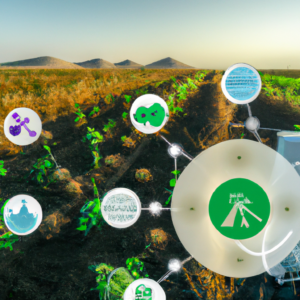Table of Contents
“Revolutionize your farming practices with AI-powered solutions for sustainable crop management.”
Call to action: Discover the benefits of Smart Farming Solutions and AI Tools for Sustainable Agriculture and Crop Management at BestBrandSup. Click here to learn more: https://bestbrandsup.com/.
Introduction
Smart Farming Solutions: AI Tools for Sustainable Agriculture and Crop Management are innovative technologies that are transforming the agricultural industry. These tools use artificial intelligence (AI) to collect and analyze data from various sources, such as sensors, drones, and satellites, to provide farmers with real-time insights into their crops and soil conditions. By using these insights, farmers can make informed decisions about when to plant, irrigate, fertilize, and harvest their crops, leading to increased yields, reduced costs, and improved sustainability. In this article, we will explore some of the most promising AI tools for smart farming and their potential benefits for farmers and the environment.
Agricultural AI Solutions for Sustainable Agriculture
Agriculture has been the backbone of human civilization for thousands of years. However, with the growing population and the increasing demand for food, the traditional methods of farming are no longer sufficient to meet the needs of the world. The need of the hour is to adopt smart farming solutions that can help farmers increase their productivity while minimizing the impact on the environment. This is where Artificial Intelligence (AI) comes into play.
AI has the potential to revolutionize the way we farm. It can help farmers make informed decisions about crop management, soil health, and water usage. AI-powered tools can analyze data from various sources such as weather patterns, soil moisture levels, and crop growth rates to provide farmers with real-time insights into their farms. This can help them optimize their farming practices and increase their yields.
One of the biggest challenges facing farmers today is the impact of climate change on agriculture. Erratic weather patterns, droughts, and floods can have a devastating effect on crops. AI-powered tools can help farmers mitigate these risks by providing them with accurate weather forecasts and early warning systems for extreme weather events. This can help farmers take proactive measures to protect their crops and minimize losses.
Another area where AI can make a significant impact is in soil health management. Soil is the foundation of agriculture, and its health is critical to the success of any farming operation. AI-powered tools can analyze soil samples and provide farmers with insights into the nutrient levels, pH levels, and other factors that affect soil health. This can help farmers make informed decisions about fertilization, crop rotation, and other practices that can improve soil health and increase yields.
AI can also help farmers optimize their water usage. Water is a scarce resource in many parts of the world, and farmers need to use it wisely. AI-powered tools can analyze data from sensors and other sources to provide farmers with real-time insights into soil moisture levels, crop water requirements, and other factors that affect water usage. This can help farmers optimize their irrigation systems and reduce water waste.
In addition to these benefits, AI can also help farmers reduce their environmental impact. By optimizing their farming practices, farmers can reduce their use of pesticides and fertilizers, which can have a negative impact on the environment. AI-powered tools can also help farmers reduce their carbon footprint by optimizing their use of energy and other resources.
In conclusion, AI-powered tools have the potential to revolutionize agriculture and help farmers meet the growing demand for food while minimizing their impact on the environment. By providing farmers with real-time insights into their farms, AI can help them optimize their farming practices, increase their yields, and reduce their environmental impact. As the world population continues to grow, it is essential that we adopt smart farming solutions that can help us feed the world sustainably. AI is one of the most promising technologies in this regard, and we must continue to invest in its development and adoption.
Q&A
Q: What are some examples of AI tools used in smart farming solutions?
A: Some examples of AI tools used in smart farming solutions include precision agriculture, crop monitoring, soil analysis, weather forecasting, and automated irrigation systems.
Conclusion
Smart Farming Solutions: AI Tools for Sustainable Agriculture and Crop Management are becoming increasingly important in modern agriculture. These tools can help farmers optimize their crop yields, reduce waste, and improve sustainability. AI-powered sensors and drones can monitor crop health and soil moisture levels, while machine learning algorithms can analyze data to provide insights into crop growth patterns and predict potential issues. Overall, the use of AI in agriculture has the potential to revolutionize the industry and help farmers produce more food with fewer resources.
